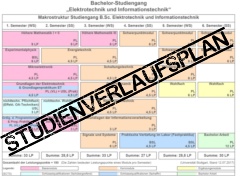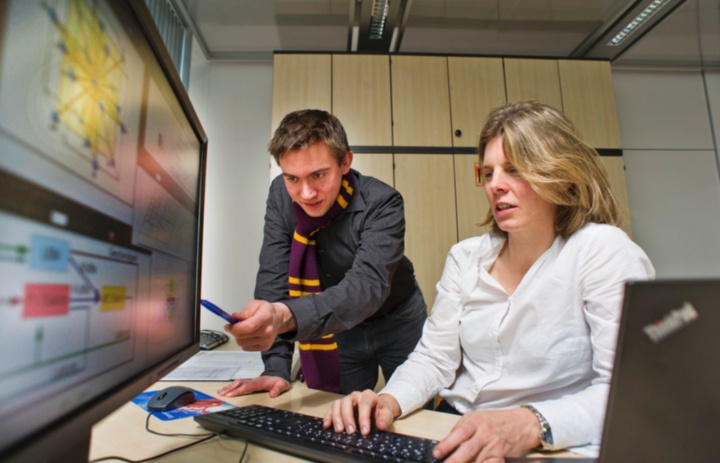In the age of digitalization and networking, computer science has become a fundamental science whose findings now shape all areas of life: it is for fields like business, research, medicine, mobility and communication to work without computer science. The basis of all these applications is the systematic and automatic processing of information. The Bachelor's degree therefore covers all core areas of computer science: theoretical computer science, which deals with the complexity and decidability of problems and their modeling; practical computer science, which develops concepts for solving problems; and technical computer science, which deals with the underlying hardware.
The Study Choice Compass B. Sc. Computer Science provides an additional overview over the study program.
The Bachelor's degree program in Computer Science is designed for six semesters. The first three semesters comprise the foundation courses, in the last three semesters students can specialise themselves. The program is divided into compulsory and elective areas. Courses in the compulsory area are compulsory for all students, while students can choose their own areas of interest within the elective areas.
During the first two years of the Bachelor's degree program students focus on understanding the basics of computer science. Mathematics and theory characterize the beginning of the program. You will learn how to program and develop software. You will learn everything you need to know about data structures and algorithms and build up a comprehensive knowledge of the theoretical and technical foundations of computer science. In short, you will initially be trained to become a computer science all-rounder. Subsequently, ythere is a thematically broad program from theory to hardware, mainly in the form of traditional courses (lectures and exercises), each completed by a written or oral examination. Relying on the basic modules, computer science students at the University of Stuttgart deepen their know-how in a series of core modules. These include, for example, system concepts, computer organization, modelling and human-computer interaction. Overall, students are equipped with a solid knowledge of many areas of computer science and acquire the ability to familiarize themselves with other areas. In the 5th and 6th semesters, you can choose modules from various catalogs and thus specialize individually.
These courses are accompanied by two projects: the programming project and the Bachelor's research project. In these projects, you work in a team on a topic of your choice. In the elective area, you also have the opportunity to take an application subject worth up to 12 ECTS credits and thus specialize further for the professional world. At the end of your studies, you will be able to apply all the knowledge you have acquired and write your first own scientific paper - the Bachelor's thesis.
In contrast to computer science, software-related topics are particularly emphasized in software engineering. In general, it can be said that computer science emphasizes the analytical aspect and thus focuses more strongly on the theory, while software engineering emphasizes the constructive aspect and thus focuses more on the application of computer science in practice. However, as there is a wide range in both programs, there will be students of computer science who are very practice-oriented as well as students of software engineering who will discover the appeal of theory and orient themselves accordingly. So there is no wall between these programs, and the achievable qualifications overlap significantly.
Modules
The degree programme is divided into modules for which the credit points (ECTS). They will be asigned after passing the module examination or after passing all module partial examinations. Modules have a size between 3 and 18 ECTS. The modules comprise content-related courses and extend over one or two semesters at most.
Module handbook
Detailed descriptions of the individual modules can be found in the Module handbook of the respective degree program. However, since the module manuals of the individual degree programmes must be revised and, if necessary, updated every semester, you will find the current version of the module handbook of your degree programme for the current semester in the C@mpus system.
ECTS Credit Points
During the course of study, ECTS credit points have to be acquired by passing modules. The average number of ECTS credits per semester is 30. One ECTS credit corresponds to a workload of about 30 hours. ECTS credits are therefore a quantitative measure of the time required for the study. A total of 180 ECTS credits are required for the Bachelor of Science.
The formal requirements for the Bachelor's degree program in Computer Science are the general university entrance qualification (Abitur) or a corresponding equivalent qualification as well as qualifying knowledge of German, as the main language of instruction is German.
Previous knowledge of programming is not required, but it helps to get started. Sound mathematical knowledge is particularly recommended in order to be able to follow the study contents adequately.
Since the change from school to university is often perceived as difficult, especially in the so-called MINT subjects (mathematics, computer science, natural sciences, technology), the University of Stuttgart offers both preparatory courses and semester-accompanying courses for support in these subjects. Information on this can be found on the pages of the MINT-Kolleg.
The degree program B.Sc. Computer Science has a restricted admission (150 places). An application is only possible for the winter semester of each year. It takes place online via the C@mpus portal of the University of Stuttgart. Information and forms can be found in the application information of the Central Student Advisory Service. The complete application documents must be uploaded to the C@mpus portal by 15 July of each year. Paper documents are only required for enrollment.
Deadlines
for the winter semester: July, 15
for the summer semester: April, 15 (entrance into a higher semester only)
For all further information, inquiries, individual advice, etc., our student advisory service is at your disposal. For general application questions, the pages of the Registrar's Office will also help you.
When you think of your future career prospects, software development is probably the first thing that comes to mind, for software as a stand-alone product, but also as part of a larger system, such as a car or an airplane. Even though this field still offers many jobs, a university degree in computer science will open up many more opportunities for you: During your studies, you have intensively trained your skills to analyze and solve complex problems, and the wide range of electives allows you to find and deepen your interests - this offers you the best prospects in research and development across all industries, but also in consulting or teaching.
A university career is recommended if during your studies you discover an above-average interest in research topics. In this case, Bachelor's graduates can deepen their academic training in a subsequent Master's degree program (see next section) in order to acquire the content requirements to start a doctoral thesis.
A good Bachelor's degree qualifies for a Master's degree program in Germany and Europe, especially for the Master's programs in the Department of Computer Science at the University of Stuttgart.
A Bachelor's degree is one of several prerequisites for an admission to a Master's program. Admission can also take place conditionally, i.e. previous to the successful completion of the Bachelor's degree. Currently, there are the following Master's degree programs in the Department of Computer Science:
- M.Sc.Informatik
- M.Sc. Software Engineering
- M.Sc. Artificial Intelligence and Data Science
- M.Sc. Computer Science (English program)
- M.Sc. Computational Linguistics (English program)
- M.Sc. Autonome Systeme ((in cooperation with the Department of Electrical Engineering and the Faculties 4 and 7)
- M.Sc. Information Technology (English program; in cooperation with the Department of Electrical Engineering).
The four-semester Master's programme usually comprises 120 ECTS credits; its contents are research-oriented. The Master's degree is generally the prerequisite for a doctorate and further scientific work at the university or at any other research institution.
Ansprechpartner zum Studiengang Informatik

Katrin Schneider
Dr.Program Manager, Department Manager & Erasmus Coordinator of the Computer Science Department

Stefan Zimmer
Dr.Academic Advisor Computer Science




